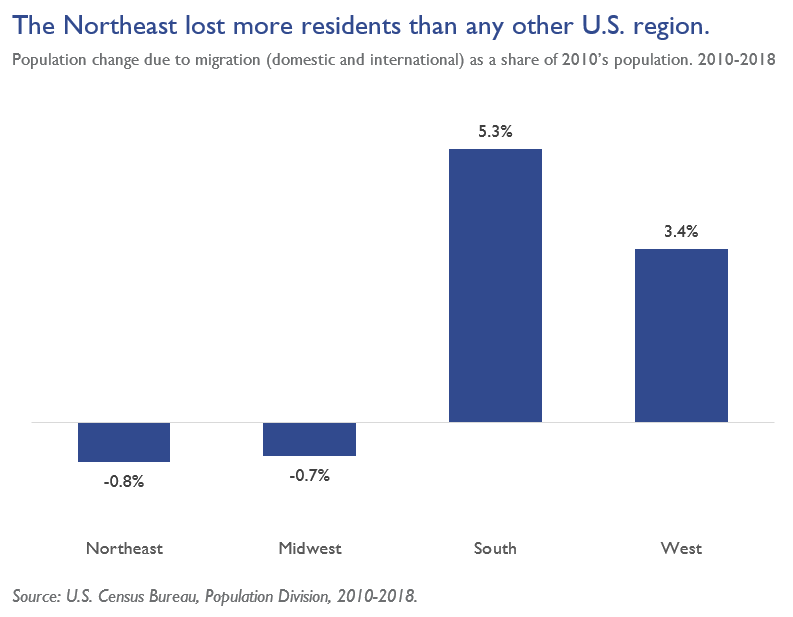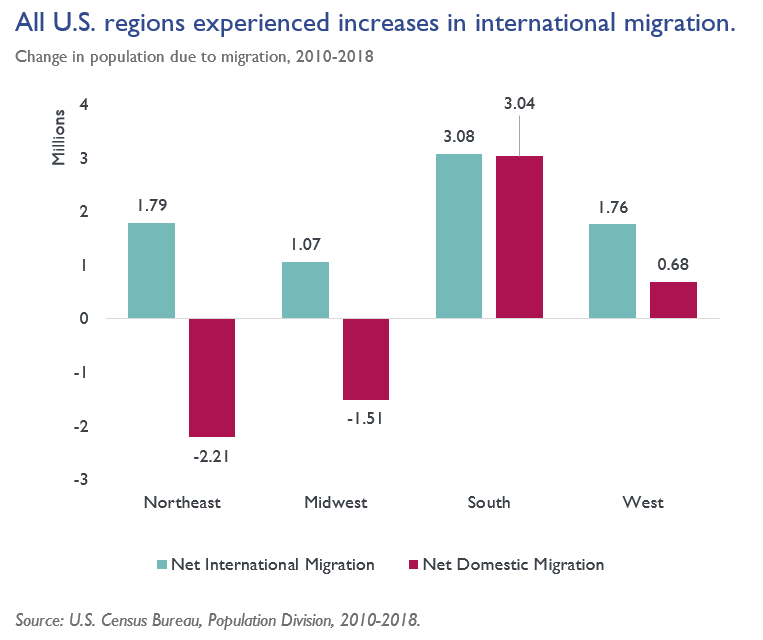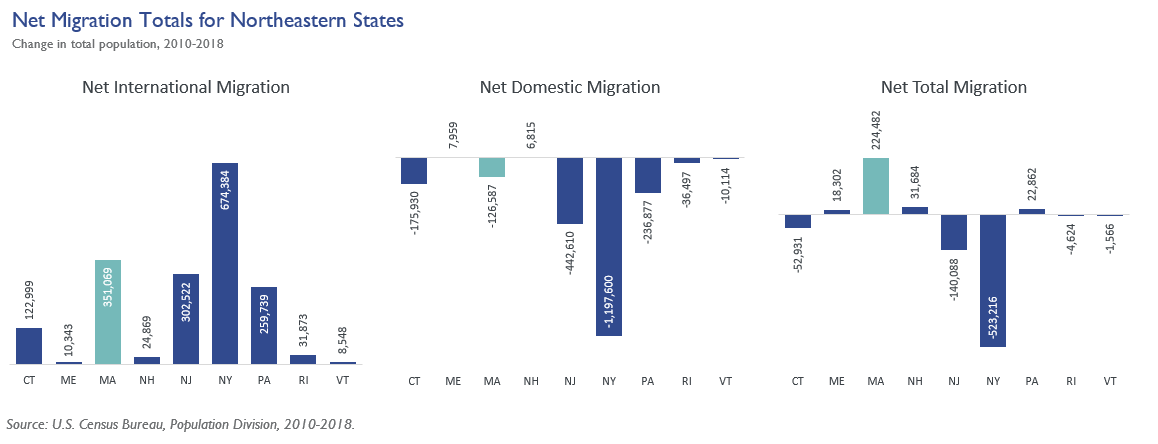If not for international migration, Massachusetts would be losing population.
By Peter Ciurczak
January 31, 2019
This is an online version of our Boston Research Snapshot email newsletter from March, 2019. Sign up to get the newsletter in your inbox every month.
Between 2010 and 2018, the Northeast lost more residents than any other U.S. region. Fortunately, Massachusetts actually experienced a net gain as increases from international migration outpaced losses from domestic migration. These findings are from a Boston Indicators analysis of new data released by the Census Bureau’s Population Estimates Program.
Looking just at the effect of household decisions to move to and from U.S. states (not including the effect of births and deaths), the Northeast experienced a loss of almost one percent of its 2010 population, the largest loss of any region. From 2017 to 2018 alone, the Northeast lost 63,000 people due to net migration out of the region. People moving out of the Northeast tend to be seeking some combination of new job opportunities, cheaper housing and warmer weather.
Since net migration is the combined effect of domestic and international moves, the graph below splits these two dynamics apart to show how they’re playing out in different regions. Since 2010 every region saw a net increase in international migration, but only the Northeast and Midwest experienced domestic loses.
While the majority of Northeastern states lost population to migration relative to their 2010 bases, Massachusetts actually gained more than 3 percent of its population by 2018. This growth was the largest of any state in the Northeast, and was driven by people moving to the Commonwealth from outside the country. Within the Northeast, our growth from international migration was second only to New York’s.
While the Population Estimates Program doesn’t allow us to analyze which states Massachusetts residents are moving to, a different Census Bureau data product—the American Community Survey—does provide some of this information. Between 2016 and 2017, Massachusetts lost more residents on net to New Hampshire than to any other state. On the flip side, we experienced a net gain of about 8,000 residents from New York. Puerto Ricans also feature prominently among those moving here. Massachusetts has long had a large Puerto Rican population, and Hurricane Maria in 2017 led many more to migrate here. Only Florida and Pennsylvania have seen greater net migration from Puerto Rico than Massachusetts.
Top 10 States to WhichMassachusetts Lost More ResidentsThan It Gained (2016-17) |
Top 10 States from WhichMassachusetts Gained More ResidentsThan It Lost (2016-17) |
||||
| States | Net Change | States | Net Change | ||
| New Hampshire | -9,317 | New York | 8,007 | ||
| Florida | -6,713 | Puerto Rico* | 5,601 | ||
| North Carolina | -4,389 | New Jersey | 4,273 | ||
| California | -4,029 | Delaware | 1,186 | ||
| Rhode Island | -3,862 | Michigan | 977 | ||
| Maine | -3,468 | Georgia | 860 | ||
| Connecticut | -2,864 | Idaho | 732 | ||
| Washington | -2,018 | Utah | 685 | ||
| Vermont | -1,975 | Louisiana | 598 | ||
| Arizona | -1,352 | Minnesota | 534 | ||
| * Though a U.S. Territory, Puerto Rico is referred to here as a state for ease of comparison. Source: U.S. Census Bureau, American Community Survey, 1-Year Estimates. 2016-2017 | |||||
Analyzing data from the Census Bureau’s Current Population Survey, as was done for Massachusetts in Governing magazine, gives a sense of what drives people to move. Almost a third of people moving out of Massachusetts left because they got new jobs or transferred out-of-state, while one in five residents moved out for reasons related to housing. Similar to Massachusetts, twenty-three percent of movers from both New York and New Jersey cite housing as a reason to leave their states. Taken together, the movement out of high-cost housing markets in MA, NY and NJ suggests that a lack of affordable housing may be a significant driver of migration away from the Northeast.
Reasons for Leaving(Reasons people are leaving, as a share of all movers out of Massachusetts) |
|
| Reason | % |
| New job or job transfer | 29.8% |
| Housing-related reasons | 21.6% |
| Other family reason | 16.5% |
| Change in marital status | 4.8% |
| To establish own household | 4.1% |
| Change of climate | 3.3% |
Note: Analysis performed by Mike Maciag, Governing.com, retrieved 1/23/2019.
Source: 2015-2017 Census CPS microdata from IPUMS-CPS, University of Minnesota |
|



